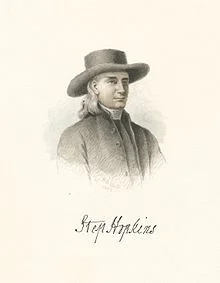Samuel Ward Sets Petty Issues Aside
Samuel Ward was a longtime leader of Rhode Island politics when the American Revolutionary War broke out.
Ward and his longtime rival put their differences aside to fight a greater enemy: Great Britain. In doing so, they set the colonies on the course toward independence.
Samuel Ward
Samuel Ward’s political rival was Stephen Hopkins.
The two men repeatedly battled each other for control of Rhode Island politics.
By 1761, Ward had lost the race for Governor in three consecutive election cycles. However, due to his respect in the community, Samuel was chosen as Chief Justice of the Rhode Island Supreme Court.
Governor
Ward only held the title of Chief Justice for one year, as he was finally elected Governor of Rhode Island and could not hold both positions.
Two years later, Ward’s term was up. Hopkins was again chosen as Governor.
Two year after that, Hopkins’ term was up. Ward was again chosen as Governor.
After Ward’s second term? Well, Hopkins was elected as Governor, of course.
Stamp Act
During Samuel’s second term, Parliament passed the Stamp Act.
Under his watch, Rhode Island sent representatives to the Stamp Act Congress in New York City. These delegates included his brother, Henry Ward. The resulting appeals to London asked for a repeal of the new taxes.
Samuel Ward was the only colonial Governor who did not swear an oath to uphold the new laws and his customs agent did not enforce the stamp taxes.
Retirement
Although Ward was replaced by Hopkins for the next gubenetorial term, the two men put a halt to their two-decade rivalry. They knew the tyranny of Great Britain was a serious threat and felt working together was the best way to strengthen Rhode Island’s resistance.
They both supported Josias Lyndon who easily won election.
Samuel Ward retired to his farm where he became an expert animal breeder. While he successfully bred many farm animals, he became most notable for his race horses.
First Continental Congress
Rhode Island, in 1774, was one of the main colonies who pushed for a general meeting of representatives from each section of the Eastern Seaboard.
The result was the First Continental Congress.
The two delegates chosen to represent Rhode Island were the old adversaries, Stephen Hopkins and Samuel Ward.
The two men traveled to Philadelphia where they both signed the Continental Association, which was the first Founding Document of the United States.
As the most openly pro-independence colony, Rhode Islands representatives called for separating from the Mother Country early in the precedings. These ideas were considered premature and tabled.
Unfinished Business
By March of 1776, Thomas Paine’s Common Sense had become a best seller. The idea of separating from Britain was becoming more and more popular.
Meanwhile, Rhode Island was suiting up to declare independence on its own, instead of waiting for the Continental Congress to act. It would do so on May 4, 1776, a full two months before the United States.
Unfortunately, Philadelphia was a major American city and, as such, was susceptible to disease. Yellow fever outbreaks were a regular occurrence and Samuel Ward caught the sickness.
Ward passed away at just 50 years old and would not see either Rhode Island or the United States declare their independence. Though, as a major supporter of this move, it is fair to say had he lived just five more months, he would have joined Hopkins and the other delegates in signing the Declaration.
Thank you for reading.
If you would like to learn more about Rhode Island’s lead up to the American Revolutionary War, might I suggest ‘A Dependent People.’ This is an interesting book that help gives the reader an understanding of how interconnected life in Rhode Island was, both to international trade and to each other. There is a link to our affiliate below which describes the book in more detail.






